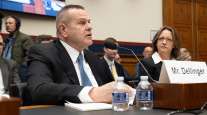Senior Reporter
ATA Leadership Touts Wins on Federal, State Levels

[Stay on top of transportation news: Get TTNews in your inbox.]
HOLLYWOOD, Fla. — The trucking industry is scoring wins on the national and state levels, and is hunkering down to tackle issues atop its agenda, adopting a nimble approach that puts the best course to victory at the forefront, said American Trucking Associations President Chris Spear at the federation’s annual Mid-Year Management Session.
“They’re seeing us involved with the agencies — not just the Department of Transportation and [Environmental Protection Agency]. We’re working with our federation and state association executives,” Spear said. “They’re seeing action in states like California, with the Air Resources Board, Florida on lawsuit abuse, Iowa lawsuit abuse. We are leveraging the entire strength of the ATA federation to be engaged at all levels, even if that means inverting where ATA is now not leading on the issue, but supporting the states on the issue. So it’s caused us to think and act differently.”
In Florida and Iowa, state association leaders have helped shepherd through state-level legislation that limits the settlements juries can award in lawsuits against trucking companies, a move aimed at plaintiffs’ attorneys who are prone to seeking exorbitant sums in cases where trucks are involved in accidents.
A top issue for ATA now is educating lawmakers about the risks of rushing too quickly toward electric and fuel-cell vehicles, with Spear noting that the recent decision by the California Air Resources Board to move forward with its Advanced Clean Fleets regulation is premature.
ATA's 2023 Mid-Year Management Session (MYMS) is off to a great start! This morning's meetings were filled with thought-provoking discussions on #trucking's most pressing issues. #mymgmt23 pic.twitter.com/dPVBwVMNNX — American Trucking (@TRUCKINGdotORG) May 5, 2023
“We’re not saying no — we’re not the association of no,” he said. “We’ve got a 40-year pedigree working with the EPA to reduce tailpipe emissions, to deploy the latest, greatest innovative equipment available. And they’ve allowed our industry today to work collaboratively to allow innovation to thrive.”
The CARB regulation will require some motor carriers operating in the state to begin transitioning to zero-emission trucks as soon as next year. The rule was approved despite concerns expressed by some truckers that sufficient numbers of zero-emission trucks and the infrastructure required to power them may not be available as soon as required. CARB’s goal is to have fleets operating in the state be 100% electric by 2035, 2040 or 2045, depending on the size and type of truck.
“The targets that are being put forth are just simply too aggressive. And that’s not just coming from me as an association head. That’s coming from the engineers, the innovators, the people that actually know what it takes to squeeze blood out of a rock,” Spear said.
Spear stressed that trucking is committed to moving toward zero-emission vehicles, but at a more measured pace. “We’re committed to that,” he said. “It’s just the timelines are unachievable. We do not have the technology available. And even if we did the deployment of that equipment, the adoption of that equipment, just simply will not happen in that amount of time.”
On the labor front, Spear said he is watching closely negotiations between the Pacific Maritime Association — which represents West Coast ports operators — and the International Longshore and Warehouse Union workers as the two sides work on a multiyear contract.
The International Brotherhood of Teamsters is also in contract talks with both UPS Inc. and LTL carrier Yellow. The ATA leader stressed leadership on the federal side could help advance fair labor deals.
We always learn so much in the American Transportation Research Institute (ATRI) Update at #mymgmt23! Thank you to our presenters - ATRI President Rebecca Brewster and ATRI Senior VP Daniel Murray. @Truck_Research #ATRI #truckingresearch pic.twitter.com/vft0aPfSgq — American Trucking (@TRUCKINGdotORG) May 5, 2023
“All of these talks are underway, and they’re overlapping because they’re not getting them across the finish line,” Spear said. “We need good leadership, and we need a president and a secretary of Labor that aren’t out there saying, ‘We are the most pro-union president and administration in history.’ Because when you get thrown a contract that can’t be resolved, it is your statutory responsibility to get in the middle and mediate. You can’t do that when you’ve already shown your cards.”
Spear reiterated his belief that President Joe Biden’s selection to be the new secretary of Labor, Julie Su, is not the right person for the job. He pointed specifically to her position on California’s Assembly Bill 5, which upends the rights of truck drivers to be independent contractors. “It’s a question whether she has the skill set to do the job,” he said. “I don’t think she does.”
Another thorny issue is the overall outlook for the economy. Both Spear and ATA Chief Economist Bob Costello said from the event that they believe the economy is slowing significantly. While the unemployment rate fell to 3.4% and employers added 253,000 new jobs in April — including 10,600 in the transportation and warehouse sector — the Federal Reserve hiked interest rates by .25% to a range between 5% and 5.25%, the highest level in 16 years, to slow down the economy and combat inflation. Costello believes the economy is likely to dip into a recession later this year, but believes it will be relatively short and will lead to the economy showing growth again starting in 2024.
Want more news? Listen to today's daily briefing above or go here for more info
“The real strength here is in services,” Costello said. “People are spending a lot more traveling and on services, generally more than buying goods.”
For trucking, he said, that is translating to steady demand. “Contract rates are holding up,” he said. “It’s down a bit. It’s not like it’s falling off a cliff like the spot market did, but I look at the spot market as sort of the extra freight — and there is no extra freight. It is essentially gone.”
UPS Inc. ranks No. 1 on the Transport Topics Top 100 list of the largest for-hire carriers in North America. Yellow ranks No. 10.




